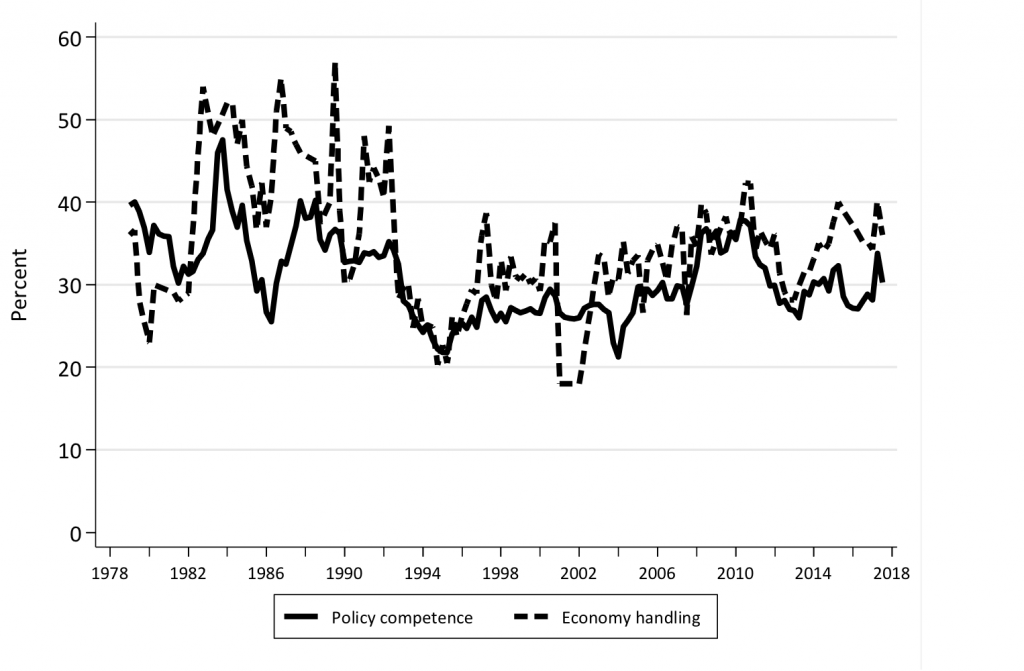
 In light of the 25th anniversary of Britain’s exit from the European Exchange Rate Mechanism, Jane Green and Will Jennings reflect on the damage done to the Conservatives as a result, and any lessons it could hold for the possible impacts of Brexit. They draw on their new book to illustrate how the party’s policy competence ratings over the years correspond to its ratings on the economy.
In light of the 25th anniversary of Britain’s exit from the European Exchange Rate Mechanism, Jane Green and Will Jennings reflect on the damage done to the Conservatives as a result, and any lessons it could hold for the possible impacts of Brexit. They draw on their new book to illustrate how the party’s policy competence ratings over the years correspond to its ratings on the economy.
It is a quarter of a century since the Black Wednesday, the day that Britain exited the European Exchange Rate Mechanism (ERM). On that day the Treasury sought to prop up the pound in the currency markets, raising interest rates as high as 15% and using foreign currency reserves to buy up sterling at an estimated cost of £3.3 billion. The government conceded defeat at 7.40pm, as Britain suspended its membership of the ERM. The crisis had profound consequences. Along with the significant economic and policy impact of the ERM crisis, the events precipitated a turning point in distrust of the Conservatives that lasted almost 20 years.
Brexit could have much worse consequences for the Conservatives if the process or the outcomes of this most challenging of political shocks goes badly for the government. The ERM crisis was a shock to the political system, but Brexit is arguably a much bigger one.
To appreciate the impact of the ERM crisis we show below the Conservatives’ ratings on the economy long before and after Black Wednesday and also the average handling rating of the Conservatives on all other policy issues, their ‘policy competence’ (a total of 18 issues). This reveals a drastic drop in how the Conservatives were trusted following the crisis – not just on the economy.
Black Wednesday triggered a collapse in public confidence in the party to manage policy issues. This was followed by a steady drip-drip of bad news, a struggling housing market, a string of embarrassing financial and sex scandals, deteriorating public services, internal party divisions over the issue of Europe, leadership difficulties and a broad shift in the public mood to the left. It set the stage for the landslide victory of Tony Blair in 1997. The Conservatives have not known the positive economic ratings they held before Black Wednesday since.
What lessons does the ERM crisis hold for Brexit?
We analysed almost forty major policy shocks across four countries over an extended time period. When these shocks occur, they act as unmissable political signals that reshape public opinion about party competence and handling of issues for the long-term. They are so high profile and so important that they cause party supporters and the less politically attentive to revise their opinions. Against this evidence, Brexit is politically risky in the extreme.
Our book reveals how shocks – including the ERM crisis – change the political landscape. Shocks cause parties to lose their traditional issue strengths and associations; those issues voters tend to trust a party on before the shock occurs. They send a signal about a lack of trustworthiness on other issues as was the case for the ERM crisis and the Conservatives. They accelerate ‘costs of ruling’, the common decline in support over a period in government. Negative news tends to add to negative news and lead to rapid deteriorations in support for a party in power. All of these effects open up opportunities for opposition parties to offer voters an alternative. They focus voters’ minds on competence as the basis of vote choices in subsequent elections. That is all extremely bad news for the government judged as incompetent.
Of course, the outcome of Brexit may not be negative for the government at all. The negotiations may be handled very well, the government may succeed in its goal of cutting immigration, the economy may grow and prosper. But even some advocates of Brexit concede that there may be short-term economic pain for longer term economic gain. This will all have to be managed extremely carefully if it is not to have very serious consequences for the credibility of the government.
As Britain prepares to leave the EU, the party competition over Brexit has fallen into a slightly ambiguous pattern – with the Conservatives the party of Brexit, but Labour managing to hold on to voters in Brexit-voting areas, pursuing a fluid soft Brexit strategy that does not seek to overturn the popular will but leaves room for manoeuvre as events unfold. While Labour’s strategic, cynical or unintended ambiguity may not suggest a clear approach to the challenges of Brexit, it is most unlikely – based on our research – that voters would punish an opposition for a process they have no control over.
Should the Conservatives preside over a major crisis – a cliff-edge Brexit in which Britain drops out of the EU with no transitional arrangements and with major adverse consequences for the economy – then voters will recognise this in how they view party competence. Leave voters have as many reasons to lose faith in the government as Remain voters.
Brexit, then, offers a critical moment for the Conservatives. Should things go wrong, voters will not be forgiving. Some have argued that Brexit is a symptom of a longer-term process of electoral change – and a tilting of the political axis. However, the consequences of Brexit for perceptions of party competence may yet tear up the script of the new age of identity politics and values change – as competence becomes the defining dimension of political choice.
_____
Note: the above draws on the authors’ book “The Politics of Competence: Parties, Public Opinion and Voters”(Cambridge University Press, 2017). A version of this article was also published on Red Box.
 Jane Green is Professor of Political Science at the University of Manchester.
Jane Green is Professor of Political Science at the University of Manchester.
 Will Jennings is Professor of Political Science and Public Policy at the University of Southampton.
Will Jennings is Professor of Political Science and Public Policy at the University of Southampton.









In 1992 John Major won a 21-seat majority for the Conservatives in the general election. In the six subsequent elections they have never bettered that result.
No it will not be another black wednesday which was created because some idiot created a mechanismtha drove down the value of sterling.
What an extraordinary article! Not a word that the ERM was a European Project of integration that Major had foisted onto his own party against the advice of his Chancellor and is what converted Lamont into a Brexiteer., following Lawson’s misgivings and travails before him in similar experiments.
So the ERM crisis was part and parcel of the European issue and the only ‘answer’ the the problem – why the Euro, which Blair attempted to join and fortunately Brown managed to avoid. The answer to the Euro Crisis -m permanent bankruptcy for Greece and papering over the cracks in the Italian banking system. This is apart from the fundamental distortions in local labour markets that has impacted so negatively on both host nations and suppliers – Coolly labour inthe UK with Zero Hours contracts and the collapse in population of the Eastern bloc – eg Bulgaria.
So the Tories may norw be victims of a ‘Cliff Edge Brexit’ which the authors clearly have no understandin gof what is meant by the phrase – I prefer ‘Bogey Man’.
They have this image that on the morning following No Deal no trading will occur at all or that Customs Arrangeemnts shall be suspended.But trade is not an intergovernmental process but actualyl 100,000s if not Millions of separate contractual arrangements based on the Price/Quality Assessment between the contracting parties all with different end dates and renewal clauses and subject to variations of terms of which – perhaps- an element may be tariffs, which are in constsant flux and decsions for 2019 have already been taken by the parties – mine certainly have. This is rational economic behaviour.
In the absolute ‘No Deal scenario’ therefore any effects even of immediate imposition of tariffs would take a period, probably of years to be shown on contracts to have been affected, but only on those contracts and that the parties would both have found alternatives or changed the terms of the agreement. This of course ignores that the likely ‘fall in the Pound/Euro’ which may occur that day would not give us the improved advantage that the post-referendum fall did, in wiping out the difference in tariffs anyway.